Dame Millicent Garrett Fawcett (1847-1929) was the leader of the women’s suffrage movement, married to Henry Fawcett, lived at 18 Brookside, Cambridge, from 1875-84. In addition to these notes, see pages about the Millicent Fawcett and Women’s Suffrage and the life of Henry Fawcett.
![Dame Millicent Fawcett by Walery, carbon print, published September 1889, NPG Ax38301, © National Portrait Gallery, London. [Creative Commons CC BY-NC-ND 3.0]](http://trumpingtonlocalhistorygroup.org/wp-content/uploads/MillicentFawcett_1889-314x464-1.jpg)
Statue in Parliament Square, London
A bronze statue of Millicent Garrett Fawcett was a unveiled in Parliament Square on 24 April 2018. Designed by Gillian Wearing, it depicts Millicent as a 50-year old, the age at which she became President of the National Union of Women’s Suffrage Societies (NUWSS). It incorporates a banner with the words ‘Courage calls to courage everywhere’, from a speech made by Millicent after the death of Emily Wilding Davison. The plinth has images of 55 women and four men who were part of the votes for women movement.
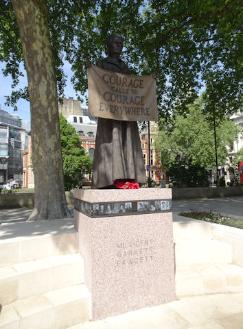
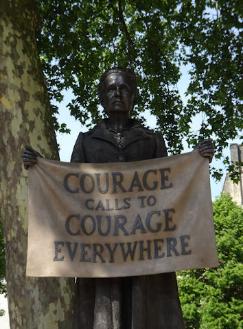
Blue plaque at 18 Brookside, Cambridge
A Cambridge blue plaque in memory of Millicent Fawcett was added to the former home of Henry and Millicent Fawcett, 18 Brookside, in spring 2018. The plaque had been unveiled at a ceremony in Cambridge Guildhall on 6 February 2018, when there were speeches from Mary Joannou, Dr Gillian Sutherland, Anne Campbell and others. The plaque to Henry had been in place since 2004.
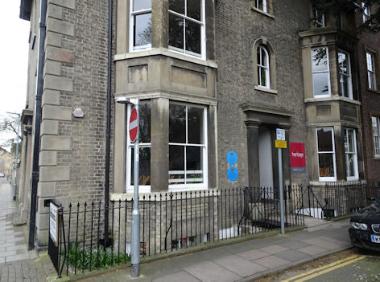
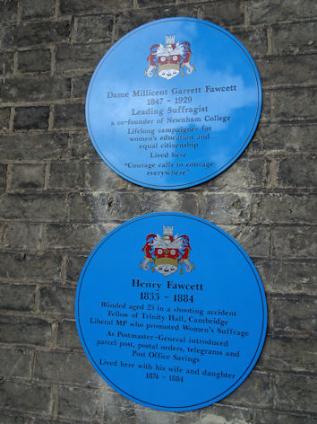
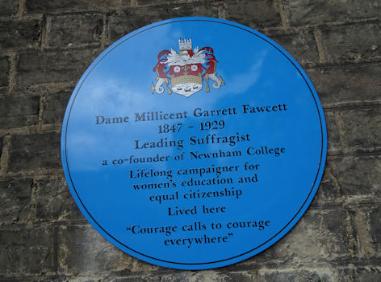
Blue plaque at 2 Gower Street, London
Millicent Fawcett lived at 2 Gower Street for 45 years, from 1884 to 1929. The blue plaque was erected in 1954.
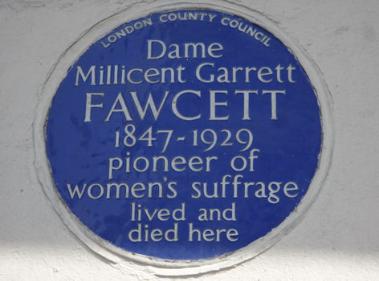
Memorial in Westminster Abbey
There is a joint memorial to Henry and Millicent Fawcett in St George’s Chapel, Westminster Abbey. The bronze roundels in memory of Millicent were added in 1932, designed by Sir Herbert Baker. The inscription reads ” Dame Millicent Garrett Fawcett 1847-1929. A wise constant and courageous Englishwoman. She won citizenship for Women”.
Millicent Fawcett Room in the Clay Farm Centre
In March 2019, one of the rooms in the Clay Farm Centre was named the Millicent Fawcett Room. The caption placed at the entrance to the room reads: Dame Millicent Garrett Fawcett (1847-1929) was a leading member of the campaign for women’s suffrage. In 1867, Millicent Garrett married Henry Fawcett, the blind radical liberal politician, who was MP for Brighton and Professor of Political Economy at Cambridge. They spent six months of each year in London and six in Cambridge. They bought the house at 18 Brookside, Cambridge, in 1875 and lived there until Henry’s death in 1884. Henry Fawcett was buried in Trumpington churchyard and there is a memorial to him in the Church and Fawcett Primary School was named in his honour. Millicent and her daughter moved to London and Millicent continued her commitment to the suffrage campaign and the National Union of Women’s Suffrage Societies (NUWSS). There are blue plaques to Millicent Fawcett and Henry Fawcett on 18 Brookside. There is a bronze memorial to both of them in Westminster Abbey, with the citation to Millicent “A wise constant and courageous Englishwoman. She won citizenship for Women”. Millicent Fawcett is also commemorated by a memorial in Parliament Square, unveiled in April 2018, with the words “Courage calls to courage everywhere”.
Trumpington and the Vote
“The Ladies’ Red Cross Working Party at Anstey Hall has recently reached its first birthday (out of long clothes and ready for the vote, it is whispered!).” Trumpington Parish Magazine, July 1917.
Publications
Janet Howarth. Fawcett, Dame Millicent Garrett [née Millicent Garrett] (1847–1929). Oxford Dictionary of National Biography.
Leslie Stephen. Fawcett, Henry (1833-1884). Oxford Dictionary of National Biography.
Copy at https://en.wikisource.org/wiki/Fawcett,_Henry_(DNB00)
Ray Strachey (1931). Millicent Garrett Fawcett. : John Murray.
Rita McWilliams Tullberg. Fawcett, Philippa Garrett (1868–1948). Oxford Dictionary of National Biography.
Jane Robinson (2018). Hearts and Minds: the untold story of the Great Pilgrimage and how women won the vote. : Doubleday.